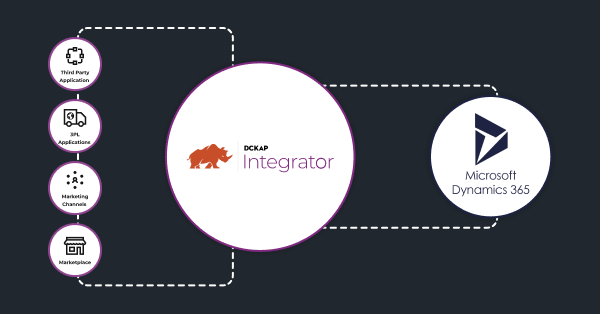Microsoft Dynamics 365 is a comprehensive business management solution that combines Customer Relationship Management (CRM), ERP, and financial management into one platform. Dynamics NAV has been rebranded as Dynamics 365 Business Central On-Premise. The name change is a result of Microsoft’s decision to bring the entire Dynamics portfolio under the Dynamics 365 umbrella.
Contents
Microsoft Dynamics 365 Integration
Microsoft Dynamics 365 is a complete business management solution that consists of five core modules:
- Sales (CRM), which includes marketing automation capabilities for leads and accounts to complement.
- Service (CRM), which includes service automation capabilities for case management and workflows.
- Marketing, which helps you to manage contacts, campaigns, and leads, as well as customer relationship nurturing, prospect segmentation, campaign planning, execution and communications efforts.
- Project Service Automation (PSA), which includes project management capabilities for project scheduling, resource management, and billing.
- Finance tools, which help you track financial information such as revenue, expenses, and budgets over time. You can also use these features to send invoices to customers automatically when work is complete.
Microsoft Dynamics 365 integration for Financials, Customer Service and Field Service provides a 360-degree view of your business and helps you identify areas for improvement. The integration helps you to:
- Convert data from Dynamics 365 for Financials, Customer Service, and Field Service into useful information that can be used to make effective decisions.
- Automated data transfers between systems using connectors and adapters. And provides real-time information to improve decision making, automate business processes and reduce human errors.
- Ensure real-time data is available to teams across their preferred apps via a single source of truth.
Relevant Reading: Microsoft Dynamics CRM Data Integration Explained
Microsoft Dynamics 365 Integration: Boost Your Sales & Marketing Efforts
Integrations can prove to be a boost for your marketing and sales teams while also helping to improve productivity and performance. Dynamics 365 provides a comprehensive view of all customer interactions, so you can more easily identify opportunities and close deals. It also helps you more effectively target potential customers, create marketing campaigns, and track the success of your efforts.
Moreover, for businesses that are already using other Microsoft software products (such as Office 365 or Dynamics GP), integrating Dynamics 365 with these products can provide even more benefits. Also learn more about Microsoft Dynamics 365 EDI integration .
Microsoft Dynamics 365 Integration Applications
Integration With Storefront
Microsoft Dynamics 365 integration with storefronts is a powerful way to manage your business. Microsoft Dynamics 365 provides an easy way to collect data about your customers and their transactions.
In addition, the integration allows customers to access their account details directly from Storefronts by using their Microsoft Live ID. And store owners can also upload product information into Storefronts, where products are automatically added to the catalog and can be sold online.
Integration With Marketplace
Integrating Microsoft Dynamics 365 with the marketplace will help you:
- Automate the order fulfillment process.
- Improve the quality of your service by identifying and resolving issues before they affect customers.
- Reduce the time it takes to create pricing plans and promotions based on historical data about product performance across channels and markets
Integration With Marketing Channels
Marketing channels are a critical part of the marketing mix. They help the company to reach its target customer base and sell products and services. Microsoft Dynamics 365 for Marketing is a powerful platform that allows enterprise-wide marketing automation and personalization across channels. Moreover, you can integrate Microsoft Dynamic 365 with your marketing channel to Channels:
- Plan and schedule your marketing activities.
- Create marketing campaigns, activities, and templates from scratch or from templates.
- Track the performance of your marketing campaigns through metrics such as leads generated and revenue generated.
Relevant Reading: BigCommerce Microsoft Dynamics 365 Integration Explained
Integration With 3PL Application
With Microsoft Dynamics 365, you can easily integrate with third-party applications and services without the need for coding or programming. This allows you to do things like:
- Update inventory levels directly from an external 3PL system, such as Amazon Marketplace; instead of manual data entry from one location in your warehouse to another location
- Manage orders automatically through an order management tool like Shopify or Magento; instead of having to manually enter orders into Dynamics 365 by hand.
Benefits of Microsoft Dynamics 365 Integration
Single Source of Information
By centralizing all data in a single, networked database, redundant data input and manual searches are eliminated, and human error is greatly reduced. Communication and information exchange can be made easier across the business, saving time, simplifying processes, and allowing for more informed decision-making.
Improved data accuracy and consistency
With Microsoft Dynamics integration with other business applications, you can ensure that data is entered correctly and consistently across all systems. This can help to improve decision-making, as well as reduce the chances of errors.
Increased efficiency & Improved Customer Service
Integration can automate tasks and processes that would otherwise be manual, saving time and money. This helps to provide employees with access to accurate and up-to-date customer information, which will ultimately improve the quality of customer service.
Project delivery abstract concept vector illustration. Project planning, successful management, time and budget, customer expectations, helpdesk software, task requirements abstract metaphor.
Greater insights At Your Fingertip
By consolidating data from multiple systems into the Microsoft Dynamics application, you can gain valuable insights into your business that can help you make better decisions. The full-fledged visibility lets you make informed decisions and ensure productivity across the department by sharing insightful data in real-time by eliminating silos.
Improved Customer Service Efforts
Each customer’s data is collected in vast numbers through Microsoft Dynamics 365 integration. It examines how audiences engage with your business, and whose communities they belong to, among other things. Its BI solution can also detect consumer moods, purchasing habits, and brand loyalty — non-quantifiable data aspects that are crucial to the sales process.
This data aids customer support representatives in handling each client engagement on an individual basis. Your salespeople can interact with consumers on a human level and propose tailored solutions without missing a beat now that all of this data is in one place.
Critical Microsoft Dynamics 365 Integration Use Cases
Sales Order Synchronization
Most organizations are likely to consider e-commerce and ERP integration because of the enhanced sales order synchronization it offers. And the only way to assure a short turnaround time is to add extra resources to sync data between the two systems. Using an integrator tool, you can now easily ensure bi-directional data sync between Microsoft Dynamic 365 ERP & CRM to ensure real-time access to sale order data. Moreover, it helps to:
- Handle more orders in a day since orders are automated and much easier and faster to produce and process.
- Make order processing and fulfillment faster and more precise. And helps to ensure sales reps or customers are synced to the ERP in real-time.
- Costs of order processing and costs associated with the phone, fax, email, and paper order forms can be minimized.
eCommerce Synchronization
Many parts of your business benefit from integrating your eCommerce platform with your back-end systems:
- Maintain correct client, product, order, and shipping information without having to manually enter data.
- Maintain consistency in inventory levels and pricing across systems, and provide consumers with accurate information the first time.
- Provide a better buying experience for customers across numerous selling channels, devices, and touchpoints.
- Provide helpful customer support by providing real-time order status information as well as product, price, and stock availability.
- Extend your business model to include new business models.
- Without disrupting established channels, sell through marketplaces or directly to customers.
- Increase employee engagement, productivity, and overall workplace efficiency by breaking down corporate silos.
- Scale more easily and respond to market changes more quickly and expand to new locations and deploy new business models.
Inventory Synchronization
Inventory management powered by ERP integration improves supply chain efficiency through end-to-end inventory analysis. It can reduce the double-handling of items and automate everyday chores like reordering as a centralized system.
Furthermore,
- By synchronizing order and shipment information, you can increase supply chain transparency.
- Inventory data that is accurate will assist decision-makers in maximizing the value of data-driven insights.
- Excess inventory, shortages, scheduled replenishment, outdated inventory, and metrics, such as average, can all be tracked and reported with accurate financial and accounting.
Business Insights Synchronization
ERP and business intelligence integration pull everything together, allowing users to turn millions of data points into clear, actionable insights. BI is no longer possible without ERP.
BI software mines ERP databases and makes it easy for stakeholders throughout the organization to consume insights via dashboards and other representations.
Meanwhile, when BI capabilities are added to ERP systems, they play a significant role in strategic decision-making. With this feature, you can get real-time access to the latest sales and financial data, which helps you make better business decisions like:
- Identify opportunities and trends
- Optimize pricing and promotions
- Understand customer spend patterns
Customer Synchronization
Customer and account data are critical bidirectional sync points for your business systems. Both your shop floor and your sales staff will have quick access to client data with basic ID information, shipping history, contracts, accounts receivable, and more preserved in one solution. Furthermore, no new account or customer data will need to be manually entered into the ERP, Supply Chain Management, or Customer Relationship Management/ CRM software systems. This saves money, and time, and eliminates the possibility of human mistakes.
Suggested Reading: Ultra Commerce Microsoft Dynamics 365 Integration Explained
Microsoft Dynamics 365 Integration With DCKAP Integrator
It is common knowledge in the business world today that integration is key. With so much data floating around and many different departments, processes, and systems operating, there needs to be a way to get things talking to each other where it matters. DCKAP Integrator offers a complete iPaaS solution for integrating your Microsoft Dynamics 365 system with other business tools, non-Microsoft products, and third-party applications.
The DCKAP Integrator for Microsoft Dynamics 365 is a powerful tool built by experts in integrations for distributors. It enables you to quickly and easily connect your ERP with a myriad of third-party applications, including those in the cloud and pave the way for house in saved time, smoother operations and boosted revenue.
To know more about integration and other B2B eCommerce product suites, get in touch with us or check out our pricing plans.




